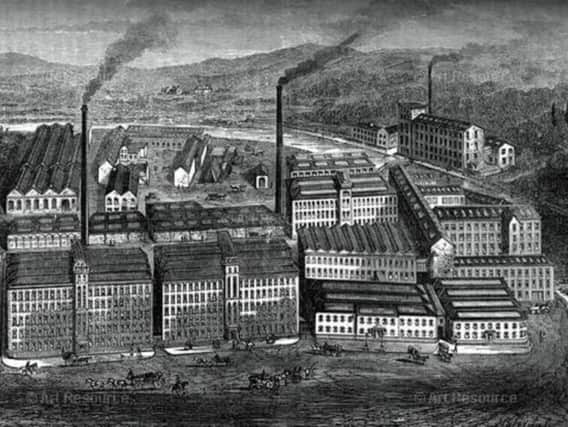Town at the centre of Scotland's "Radical War" celebrates 200th anniversary of worker's uprising


Now, the bicentenary of the role of the Paisley weavers in the 1820 Radical War is to be marked in the Renfrewshire town, which became a hotbed of protest and anti-established feeling as living standards sharply declined and call for reforms went unnoticed.
The Paisley Book Festival, the first of its kind, will next month explore the town’s radical as well as its literary talent. It was claimed that every third Paisleymean was a poet with most of the verse organised in songs sung to the rhythms of the loom.
Advertisement
Hide AdAdvertisement
Hide AdThe Paisley weavers, famed for their patterned shawls that were modelled on fine Indian muslins, were at the “vanguard of this new radicalism”, according to historian Sir Tom Devine.
Families of artisans had been employed in “high-earning fancy trades” but over suffered a “catastrophic decline from their old ascendancy as an aristocracy of labour,” wrote Sir Tom in The Scottish Nation.
“A great influx of labour had destroyed their traditional standard of living as number of weavers rose from around 25,000 in 1780 to approximately 78,000 in 1820,” the historian added.
In Glasgow, handloom weavers experienced a drop of real wages of around a third with the crash in pay exacerbated by the hard times that followed the Napoleonic Wars.
The radical tone of the Scottish workers sharpened immeasurably following the 1819 Peterloo Massacre in Manchester when 18 workers were killed and up to 700 injured when cavalry charged intoa group of unarmed civilians who had gathered in their thousands to hear calls from Parliamentary Reform.
By then, the Corn Laws, which restricted imports of grain, were pushing up food prices. People were working, but could barely afford to live.
A month after Peterloo, around 15,000 workers gathered on Meiglemoss Moor on the outskirts of Paisley to protest against events in Manchester. Flags were flown, pipes play and drums beaten.
Later, the Glasgow division returned to the city in a ‘menancing manner” with police officers attacked with brickbats and windows smashed.
Advertisement
Hide AdAdvertisement
Hide AdBack up was called for an the military arrived with canons guarding the bridges. Some calm was restored but “outrage and confusion was renewed” the following day. Magistrates were hissed at as they went to church and, later, open violence erupted once again. Innocent bystanders were wounded, windows broken and street lamps torn down.
As post-Peterloo fervour intensified, committed radicals began to meet in secret in counties from Ayrshire to Lanarkshire and Renfrewshire, Sir Tom wrote.
Union societies were transformed from “discussion clubs into insurrectionary cells bent on achieving the overthrow of government by physical force,” he added.
On April 1 1820 an Address to the Inhabitants of Great Britain and Ireland compiled by activists who formed a Provisional Government called for workers to “desist from labour” until their rights as free men were recovered. Almost immediately, around 60,000 people took part in the strike in Paisley and Glasgow where the ‘almost the whole population of the working classes’ obeyed orders.
Widespread unrest failed to materialise post-strike but the occupation of Carron Ironworks a few days later led to the Battle of Bonnymuir when workers clashed with solders. The ringleaders, Andrew Hardie, James Wilson and John Baird were executed with a memorial standing to them in Woodside Cemetery in Paisley.
Paisley Book Festival will celebrate Radical Stories and Rebel Voices across the town from 20th to 29th February 2020.
An opening night event celebrating Renfrewshire Rebels will feature an exclusive reading from Scottish radicalism author Maggie Craig, poetry from Renfrewshire born Jim Carruth, and music from Glasgow-based singer-songwriter Heir of the Cursed.
As part of the festival, playwright and artist John Byrne will return to his native Paisley for a Big Birthday Bash celebrating his 80th year. The event haas been described as "part retrospective of his incredible body of work and part a raucous knees-up".
Advertisement
Hide AdAdvertisement
Hide AdThe Fun Lovin’ Crime Writers - aka an all-star line-up of Val McDermid, Christopher Brookmyre, Mark Billingham, Doug Johnstone, Stuart Neville and Luca Veste - will swap murder for music an perform a special gig.
Meanwhile, broadcaster Kirsty Wark will be in discussion with Ruth Wishart about her new novel and her life at the forefront of political reporting, as part of the University of the West of Scotland’s Inspiring Women series.
